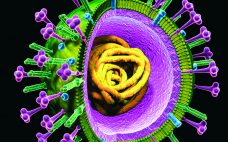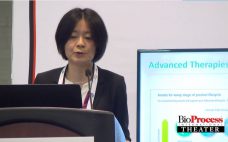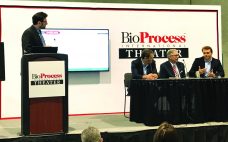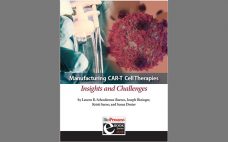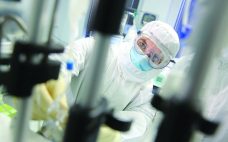Each year, over 20% of the human population is infected with the influenza virus, resulting in 250,000–500,000 related deaths globally and ~38,000 deaths in the United States alone. Of further concern is the potential for pandemic outbreaks, which pose a severe worldwide threat to public health (1, 2). Vaccination has proven to be a critical tool for controlling the spread of infectious diseases, as evidenced by the eradication of polio, smallpox, and diphtheria in most parts of the world. Influenza…
Manufacturing
The Effect of Albumin on Viability in Stem Cell Therapy
Stem cell therapies are some of the most cutting-edge and sophisticated therapeutic developments. They offer an attractive alternative approach to more widely used treatments for conditions such as multiple sclerosis, metabolic diseases, cardiovascular disease, liver disease, and cancer. But developers still face challenges, some of which can be addressed by the use of recombinant human albumin. As a long-established ingredient of cell culture media, albumin is well recognized for its ability to facilitate growth of many cell types. The industry is expanding its use of high-quality, fully recombinant, current good manufacturing practice…
Designing Laboratories for Flexibility and Collaboration
The blockbuster business model may have paid off in the past, but tomorrow’s biopharmaceutical successes will depend more on rapid and diverse discovery than on any single breakthrough. In the race to get new therapies from research and development (R&D) into pharmacies, next-generation laboratory space could become a game-changer. Blockbuster drugs typically were made in industrial laboratories — and industrial-strength measures were required to reconfigure those spaces as new research priorities emerged over time. Facing changing patient needs and ongoing…
Accelerated Development, Manufacturing and Monitoring of Viral Vectors
The goals of process intensification are to enhance production while shortening timelines, lessening contamination and environmental risks to products and operators, and reducing operating footprints. Previous publications from Sartorius Stedim Biotech (SSB) have highlighted key elements of such activities. In this report, the authors extend the scope of this discussion to tools and technologies that enable intensification of viral vector manufacturing processes. The first article summarizes presentations from a 2018 seminar for viral vaccine manufacturers. Three guest presentations highlighted the…
A Platform Production Process for Manufacturing Viral Vector and Vaccine Therapeutics Using Vero Cells
Yan Zhi, program design technical lead, Fujifilm Diosynth Biotechnologies Fujifilm Diosynth Biotechnologies (FDB) is a world-leading contract development and manufacturing organization (CDMO) with over 25 years of experience using biologicals and more than 310 projects including six licenses. Production sites are located in North Carolina and Texas. In Texas, the flexible biomanufacturing facility can handle production from preclinical to current good manufacturing practices (CGMP) commercial manufacturing. Facilities and capabilities include state-of-the-art process development; mobile cleanroom (MCR) technology with fully segregated…
Feeding the Demand for Cell and Gene Therapy Production
Moderator Dan Stanton, with Ohad Karnieli, Alan Moore, and David Brindley Moderator Dan Stanton introduced the second roundtable of Tuesday morning by commenting on the recent spate of approvals for CAR-T cell and gene therapies. With large biopharmaceutical and biotechnology companies devoting scientists and funds toward these next-generation therapies, contract manufacturing organizations (CMOs) also are investing in opportunities to expand capacity and expertise. As the panelists introduced themselves, they raised two key points for discussion: The contracting model for advanced…
Capacity Strategies: The Strategies Behind Choosing Between Large-Scale and Single-Use Investments
Moderator Dan Stanton, with Weichang Zhou, Jenifer Wheat, Roger Lias, and Jim Vogel Single-use technologies (SUTs) are now prevalent within bioprocessing, but does this spell the end of industry’s historic reliance on stainless steel and fixed facilities? This roundtable was formed to discuss the wealth of investment in single-use (SU) equipment and flexible manufacturing solutions by contract development and manufacturing organizations (CDMOs) over the past few years, pitting that against what looks like a resurgence in fixed-cost stainless steel plants…
eBook: Manufacturing CAR-T Cell Therapies — Insights and Challenges
The rapid evolution and clinical success of T-cell immunotherapies is an exciting advance in the war on cancer. This treatment modality uses engineered cells from a patient’s own immune system to target and destroy cancerous cells. Chimeric antigen receptor T-cell (CAR-T) therapy is emerging as the most studied treatment in T-cell immunotherapy and is the basis for many ongoing clinical trials. FDA approval of the first two CAR-T therapies in 2017 provides a regulatory development framework, but optimization of CAR-T…
Accelerating Intensified Bioprocesses with High-Throughput Small-Scale Tools
While many biopharmaceutical companies are exploring paths toward continuous processing, many tools already exist for implementing process intensification. As the authors of this special report illustrate, hybrid continuous processes that benefit from single-use technologies along with continuing improvements in perfusion cell culture already now are enabling improvements in cost reduction and accelerating time to market. And novel high-throughput and automated small-scale systems are helping development scientists gather more information in less time than before, reduce their development footprints, and make…
Demonstrating Scalable T-Cell Expansion in Stirred-Tank Bioreactors
Emerging cell therapies have excited the pharmaceutical industry because they indicate potential new pathways to treat some of the most life-threatening diseases. T-cell therapies currently are the flagship technology in cell therapy with recent US FDA approvals of Novartis’ Kymriah (tisagenlecleucel) and Gilead’s Yescarta (axicabtagene ciloleucel) treatments. Those therapies and others still in development use peripheral blood isolated lymphocytes (PBLs) modified with chimeric antigen receptors (CARs) or modified T-cell receptors (TCRs) to trigger the innate cytotoxic response of these immune…

